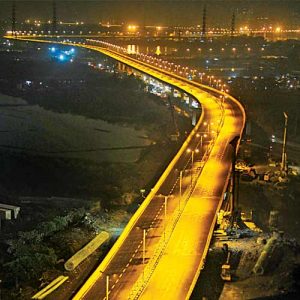Memo #237
By Simon Harding – sharding13 [at] gmail.com
 Mumbai’s new Eastern Freeway (MEF) was opened to the public on June 13. The 13.59 km publicly funded MEF is meant to ease congestion between outlying suburbs and downtown Mumbai.
Mumbai’s new Eastern Freeway (MEF) was opened to the public on June 13. The 13.59 km publicly funded MEF is meant to ease congestion between outlying suburbs and downtown Mumbai.
The Freeway is the latest of many such projects across Indian cities. As developers have taken advantage of cheaper land and higher permitted building densities to construct up-scale residential areas on the urban fringe, the demand for travel between the urban fringe and core has spiraled.
Rising incomes, increasingly affordable vehicles and incentives from a government which sees the motor industry as a key driver of economic growth have seen the middle classes turn to private cars to meet burgeoning travel demand. From 1981-2002, Indian car ownership increased seven-fold. Although the total number of cars remains low, just 18 per 1,000, compared to 800 in the US, their concentration in urban centers causes congestion, especially as it is coupled with crumbling, mixed use infrastructure.
Local transport experts fear the Freeway, whose traffic-light and toll-free lanes are exclusively for car traffic, may actually exacerbate congestion. Car owners who had switched to public transport to avoid difficult driving conditions during the monsoon will now return to their vehicles. Although the Freeway can handle high traffic volumes, its endpoint, the city centre, lacks the road and parking capacity to deal with the higher number of cars set to arrive via the MEF.
Concerns have arisen about the distribution of benefits. The MEF does little to address the growing travel demand from low-income groups on the periphery: slum dwellers relocated from central areas and newly arrived rural-urban migrants. The travel modes used by these groups, and even by the lower middle classes, namely bicycles, two- and three wheelers, are banned from the road. The MEF is not a viable as a bus route.
The MEF project faces two fundamental problems: not only may it prove inimical to its aim of easing congestion for middle class car owners but it also excludes large groups of people from the benefits of this state funded public space.
About the Author:
Simon Harding is studying for a PhD in Resource Management and Environmental Studies at the Institute for Resources, Environment and Sustainability at the University of British Columbia.

The Mumbai Eastern Freeway may actually exacerbate the congestion problems it is designed to ameliorate.
Links:
- Experts Fear an Increasing Burden on Traffic in SoBo, The Times of India (2013)
- BEST not keen on new services on Freeway, Hindustan Times (2013)
Related Memos:
- See our other memos on India
Comments are closed, but trackbacks and pingbacks are open.